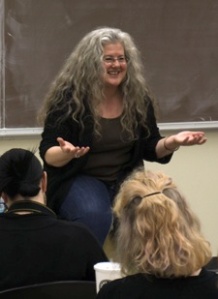Justin Bigos (poetry, ’08) interviews faculty member Dana Levin at The American Literary Review:
 Levin at University of North Texas
Levin at University of North Texas
It’s not that I think that poetry “needs” to be fictive—it’s that it is fictive: it’s a form of art, which is not life, no matter how closely an artist may feel compelled to adhere to fact. The minute you’re moved to turn life into art, you enter a fictive space—which is to say a space for making, inventing, which demands flexibility, in terms of seeing and following where composition may be directing you. And the drive to bend, blur, or ignore factual truth was crucial to me personally, in terms of writing myself out from under the crush of grief.I always think of Ted Hughes saying about Sylvia Plath, “If she couldn’t get a table out of it, she was quite happy to get a chair.” Abandoning the table for the developing chair often involves two primary things: listening to the poem (it only converses in what the poet receives as hunches, obsessions, epiphanies, and all other manner of telepathic communiques from the Muse) and (thus) relinquishing initial intent or spark for a poem, autobiographically, structurally. Plath’s famous poem, ‘Tulips,’ is often read as a poem about being carted off to the psych ward, but in fact she was on the verge of a burst appendix! I like the psych ward narrative: it’s so dramatic! It’s so Plath! Factual truth can be very deflating...[Keep Reading]…
Dana is the author of Sky Burial (2011, Copper Canyon Press).


